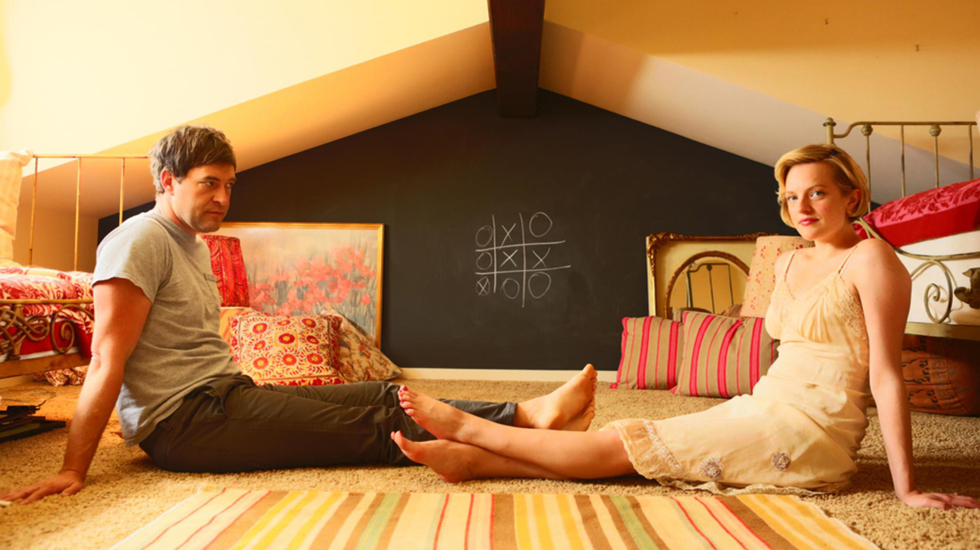
BY KAREN KEMMERLE |
Charlie McDowell On Film School, Collaboration And ‘The One I Love’
The first-time feature director talks to us about screenwriter’s Justin Lader’s “script”-ment, his amazing cast and why he prefers digital to film.

Without a doubt, one of the most talked about films at TFF 2014 was The One I Love, a different kind of love story starring filmmaker/actor Mark Duplass and Elisabeth Moss. The two star as Ethan and Sophie, a couple in crisis, who go on a weekend getaway to a isolated cabin on the advice on their therapist (Ted Danson). Once the couple arrives, they start to experience a mysterious phenomenon that threatens everything that though they knew about each other.
During the 2014 Festival, we got the opportunity to chat with director Charlie McDowell about making his first movie and finding inspiration outside of the film world.
Tribeca: You studied directing at the American Film Institute. Was it important for you to go to film school? Do you think the same knowledge can be gained from watching lots and lots of movies?
Charlie McDowell: I know that this is a heavily debated subject, but I honestly think it varies from person to person. For me, learning my craft, especially somewhere like AFI, was one of the greatest things I’ve ever done. Besides the incredible educational opportunities, I think the most important thing that you learn in film school is collaboration. You learn that other people may think and express themselves differently from you or that they may be the same as you.
At the same time, you’re all working together toward the same goal, which is to make an interesting, smart, thoughtful piece of work. I think what film school gives you is a community of people that bash their heads together to come up with something interesting to say. I think if you sit down and watch a million movies, you can imitate great filmmakers, but you’re not being inspired by actual human beings. That’s something that I really took away from AFI.
Tribeca: How vital is it for filmmakers to have a working knowledge of cinema history?
CM: I’m someone who grew up in a family who was in the film world, so I was exposed to really great films when I was a kid. They became part of my DNA and my upbringing. I’ve been blessed with a cinematic knowledge that I always have in the back of my mind. It comes out in my own directing without my even realizing it.
I do think though that the most important thing for a filmmaker is to be a really well-rounded person. At the end of the day, it’s great to admire certain filmmakers, but there are also incredibly thoughtful, smart people who don’t have a background with cinema that you can learn from [laughs]. Those people have their own voices that can inspire you as well.
I think what film school gives you is a community of people that bash their heads together to come up with something interesting to say.
Tribeca: I read that screenwriter Justin Lader supplied only a 50 page script with suggested dialogue.
Charlie McDowell: It was a 50-page “script”-ment of very detailed scenes that set up exactly what was going on plotwise and showed how the characters change emotionally over the course of the story. So it was still very much a script, but it just wasn’t in the traditional form with concrete dialogue. When we were on set, Justin would script pages for the next day. We had a mixture of scripted pages of dialogue and this “script”-ment. After having seen the film, you know that there are so many intricate twists and turns, and those were very detailed and very written out.
Tribeca: What drew you two together? How did The One I Love come to be?
CM: Justin and I have been working together on stuff for a while. I remember I had a general meeting with Mark Duplass and really connected on a human level. Justin and I had been trying to make another film that ended up falling through, and Mark called up and said, “Hey let’s make a movie together.” It took someone like Mark, who’s a really a maverick of indie filmmaking, to just say: “Enough of talking about being creative, let’s go be creative.” That’s when we decided to write something small and contained that we could control creatively and start filming whenever we wanted.
It was a collaboration between the three of us that involved coming up with the idea and filming it through a very organic process. If someone had been hired to write a traditional script, we would have never come up with this story. We wrote it progressively with a specific location in mind. It was a very different way of making a movie, but I think it ended up paying off in what you see on screen.

Tribeca: Can you talk about Elisabeth Moss’s initial introduction to the project? Was she always someone you guys were looking at?
CM: Lizzie wanted to work with Mark, and he brought her name up to me. It was exactly when I had just gotten DVDs of Top of the Lake from her agent. She’s so fantastic in that. Right away, I thought she would be an obvious, perfect fit. I really liked the idea of her and Mark as a couple because they both feel so honest.
The last thing I wanted was to find an actress who had just moved to L.A. to become an actress. I didn’t want that look. I actually think that people respond to with the film because they feel like Mark and Elisabeth could be a real couple. The audience has to ride on the fact that these two have been married but now are struggling. They have to care about them or the movie wouldn’t work.
Tribeca: I read somewhere that you prefer to watch interviews with actors instead of having them audition. Can you talk about that choice?
CM: Whenever I’m interested in an actor, I become obsessed with watching any sort of interview with him or her. I’m less interested in their acting work. Of course, I watch their past work, but I really love seeing how people act in their everyday lives and gauging the energy they put off into the world. I like to create a safe environment on set where everyone is comfortable. With this film, it was like being at camp. We all really trusted each other, and that’s super important to me. I think it comes across in their performances.
Tribeca: Were you able to have a rehearsal period with Mark and Elisabeth? How did you facilitate the process?
CM: Both Mark and Lizzie were just finishing their TV shows before we started shooting, so we had to meet up on weekends to discuss the backstory of their characters and their relationship. We didn’t rehearse in the traditional sense, but we did discuss the characters extensively. Before we shot each scene, Mark, Lizzie, Justin, our producer Mel, and I would sit together to discuss the scene. Mark and Lizzie would improv together and find the voice of the scene, and we would give small suggestions. We didn’t have a lot of shooting days, so we did take the time to get on the same page and make sure we understood the scene beforehand.
For any future feature I direct, I would probably shoot only on digital. That’s the most resourceful way to make a movie.
Tribeca: How long was the actual production of The One I Love?
CM: We shot the film in 15 days—a really quick shoot. We had two cameras, which was a really nice luxury. We were able to do cross coverage and tricks like that to get through the scenes more quickly.
Tribeca: And what cameras did you use?
CM: We used two RED EPICs.
Tribeca: Given your time in film school, have you ever worked on film or have you mostly worked in digital?
CM: I shot my thesis at AFI on 35mm. Some people would say that was a waste of money and time. However, that was right when the digital shift was happening, and I kind of knew I would probably not be able to shoot on film again. I didn’t want to miss out on that experience. I wanted to hold an actual print in my hand.
I think film feels a little different on the screen, but that feeling is starting to go away more and more as digital just gets better and better. For any future feature I direct, I would probably shoot only on digital. That’s the most resourceful way to make a movie.
Tribeca: As someone who comes from a family of actors, how did you approach the actor/director relationship?
CM: It’s funny. The first day I went to AFI, I realized I had never directed an actor before and I had no idea how to do it. I had always just made movies with my friends. I remember calling my mom [Oscar winner Mary Steenburgen] and asking, “How do directors talk to you? What am I supposed to do?” I was panicking. The advice she gave me was great: “There is no formula. Be yourself and talk to [actors] the way you would talk to anyone. Communication is the most important thing.”
There are obvious things you don’t do—like blind readings and things like that—but every director is different. She helped me to realize that you just need to establish a connection with your actors. It sounds kind of obvious. When we were making The One I Love, I went up to my actors as a friend and as a collaborator. For me, it’s less about trying to play the director role and more about speaking to actors on a human level.
Tribeca: I think the role of a director, especially in independent cinema, is changing. It requires such collaboration now as opposed to the total control that the studio system employed.
CM: That is so true. When you direct an indie, you are in charge of so many more aspects of the project than I had realized before. A huge part of directing a small film is doing the storyboarding, being prepared, and communicating with each and every member of your crew. You have your hand in so many different things that you have to be ready for anything. There is no system anymore. Directing is doing your homework beforehand and creating an idea that you can adapt if something organic comes out of the process.
The One I Love is now playing in NY and LA and will expand to more cities in the coming weeks.

